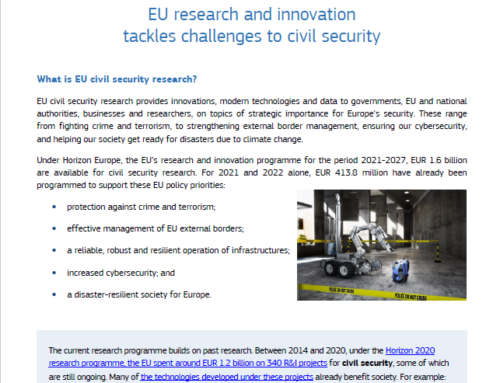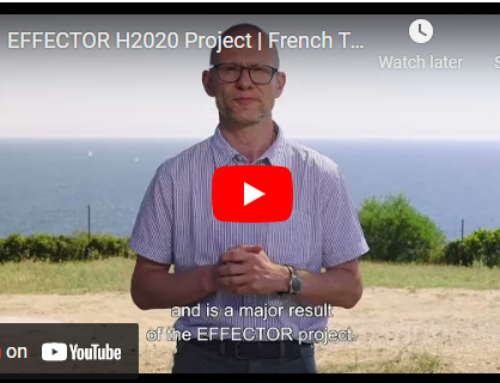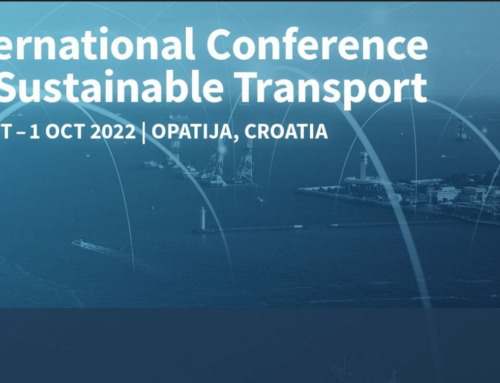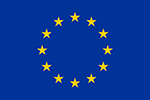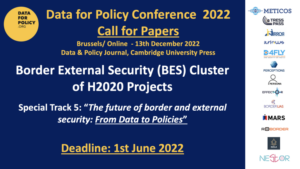 We are in a very happy position to inform you that we are now accepting submissions to our Special Track:
We are in a very happy position to inform you that we are now accepting submissions to our Special Track:
The Future of Border and External Security: From Data to Policies
that is being organised under the Data for Policy 2022 Conference.
H2020 BES Cluster Special Track: METICOS, EFFECTOR and the rest of H2020 BES Cluster partners are leading Special Track 5: The future of border and external security: From Data to Policies.
METICOS project team, along with representatives from all BES Cluster members, have joined forces and created the “Future of border and external security: From Data to Policies”, a special track that will embrace a hybrid physical-virtual format on 13th December. In addition, a dedicated call for papers relevant to the areas of expertise is in order.
Call for Papers – Topics to be covered – Submission Deadline: 1st June 2022.
H2020 BES Cluster special track will concern the role of data, new technologies and new approaches in order to strengthen EU security through border management. This includes both control and surveillance issues, on land and in the maritime domain. It contributes to the further development and enhancement of the use of new technology for border checks, also in relation to the Smart Borders legislative initiative.
The aim of this track is to present and bring forward the innovations, solutions and developments of technologies and capabilities which are required to enhance systems and their interoperability, equipment, tools, processes, and methods for rapid identification to improve border security, whilst respecting fundamental rights including free movement of persons, protection of personal data, and privacy. New technologies, capabilities and solutions are required to support the Union’s external security policies in civilian tasks, ranging from civil protection to humanitarian relief, border management, law enforcement, or peace-keeping and post-crisis stabilisation, including conflict prevention, peace-building and mediation.
An overview of the motivation and topics to be covered:
- Strengthening of security through border management;
- The role of AI in border management;
- Control and surveillance issues, on land and in the maritime domain;
- Use of new technology for border checks in relation to the Smart Borders legislative initiative;
- Supply chain security in the context of the EU’s customs policy, and migrant smuggling;
- Development of technologies and capabilities to enhance systems and their interoperability, equipment, tools, processes, and methods for rapid identification to improve border security, whilst respecting fundamental rights including free movement of persons, protection of personal data, and privacy;
- Technology acceptance monitoring: data-driven monitoring and prediction acceptance of different BCP technologies to early identify likely roll-out and adoption problems;
- Efficiency of the new border technologies, the societal and ethical impact on the non-EU citizens, the satisfaction and acceptance of both border authorities/ managers and travellers;
- Border Predictive analytics & smart decision-making support;
- Big Data Analysis in the field of border-related information;
- Perceptions of non-EU citizens and analysis of social media datasets;
- Analysis of perceptions that lead to threats and security issues on its citizens and territories, and suggestions on how such perceptions can be avoided or even actively and effectively counteracted through various measures;
- Border Data collections and evidence-based policy-making;
- Advanced technologies, tools and novel methods to be integrated with existing models and systems that will lead to a “no gate crossing point solutions”;
- New technologies, capabilities and solutions are also required to support the Union’s external security policies in civilian tasks, ranging from civil protection to humanitarian relief, border management, law enforcement, or peace-keeping and post-crisis stabilisation, including conflict prevention, peace-building and mediation;
- Data, ethics and technology acceptance in the area of border management;
- Gender and the use of no-gate solutions;
- Intersectionality and technological solutions for Border External security;
- predictions and adequate management solutions of migration flows in the European Union;
- understanding of how Europe is perceived abroad and the mechanisms involved in the process;
- Applied solutions for enhanced border and external security, including e.g. multilayered data lake platform for end-to-end interoperability and data exploitation and such.
Submissions are invited for consideration at Data for Policy 2022. Authors are advised to check all the requirements for presenters on our post-acceptance page. In particular, it is expected that one presenting author from each accepted submission will register for and attend a physical conference.
Data for Policy 2022 will run as a linear programme, and therefore the organisers may consider extending the main conference timetable if there is sufficient demand. Authors are asked to note that this is a possibility before submitting their proposals.
Submissions to Standard or Special Tracks will be accepted in the following categories:
- Individual Research/Policy/Practitioner Proposals in the form of full research papers
- Individual Research/Policy/Practitioner Proposals in the form of extended abstracts
- Panel Proposals in the form of extended abstracts
- Workshops/tutorials/demonstrations in the form of extended abstracts
The details of each submission type are below:
- Full research paper (individual research/policy/practitioner proposals):
For the benefit of those authors who wish to submit their paper for consideration in the open-access Data & Policy journal published by Cambridge University Press, we have integrated the review process for the conference into that of the journal; reviews performed for the conference will be considered as part of the journal’s peer review procedure, potentially leading to faster decisions in the journal and publication ahead of the conference. Authors interested in taking advantage of this integrated process can submit a full paper through the conference’s EasyChair system by the deadline of 1 June 2022. In order to prepare a full paper, authors can use the LaTeX and Word templates available via the Data & Policy Instructions for Authors. Please convert your article to PDF to submit to the conference’s EasyChair System; if accepted into the Journal we will ask for the source files.
Please consider the following points, which are described in more detail in the instructions that are linked to above:
- Data & Policy has three categories of papers: Research Articles (presenting novel findings; approx 8,000 words inclusive of references), Translational Articles (demonstrating data science principles, techniques and technologies in practice; approx 8,000 words) and Commentaries (an overview of existing knowledge about an issue; approx 4,000 words). In your article, please include a heading that indicates into which category your article falls;
- The journal also requires authors to provide a policy significance statement, a competing interest statement, a funding statement and a data availability statement in their article;
- The journal encourages authors to make replication data and materials openly available and to link to these in the data availability statement in their article;
- Authors should watermark or otherwise indicate in the full paper that it is ‘under review’;
- The review process is likely to include multiple iterations that extend beyond the timeline of the conference, and publication is subject to reviewer comments being reflected in the final paper;
- Note that conference acceptance does not guarantee publication in Data & Policy.
Papers that do not conform to Data & Policy’s specifications will be reviewed for their suitability for conference presentation, but will not receive full journal review. In particular, we cannot consider papers that have been previously published in any form.
- Extended abstract (individual Research/Policy/Practitioner Proposals):
This should be 1,000 words maximum, including a title, research/policy question, research methodology and data used, and key findings. Authors who decide to just submit an extended abstract – in order to present at the conference – will still have the option of submitting to the journal at a later date if they wish to do so, but will not benefit from the integrated review procedure. Note also that some Special Track Chairs are intending to guest-edit thematic collections of articles in Data & Policy, so you may be separately contacted by the Chair about the potential of submitting to the journal.
General information on the Special Track, as well as the topics of interest, is available here!
Submission of all proposal types is via the conference EasyChair system. You will need an EasyChair account to be able to do this.
Before submitting, please ensure that you have read and understood the requirements for submissions, including those for review, assessment and post-acceptance.


